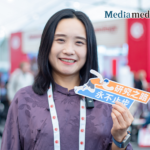
Editor's Note: The 66th Annual Meeting of the American Society of Hematology (ASH) took place in San Diego from December 7 to 10, 2024. This global event brought together leading experts to exchange insights on the latest advancements in hematology. The treatment landscape for chronic myeloid leukemia (CML), acute myeloid leukemia (AML), and acute lymphoblastic leukemia (ALL) is evolving, with tyrosine kinase inhibitors (TKIs) yielding remarkable results but leaving challenges like drug resistance unresolved. Meanwhile, innovations in AML and ALL therapies continue to shape the field. Dr. Qian Jiang from Peking University People’s Hospital presented multiple significant studies at the conference, offering new perspectives on leukemia treatment. Hematology Frontier had the privilege of discussing these findings with Professor Jiang to uncover their implications for advancing leukemia research and clinical strategies.Dr. Qian Jiang: I’m delighted to share the results of our team’s work presented at this year’s ASH meeting. Our Phase 1 clinical trial on the BCR::ABL1 allosteric inhibitor TGRX-678 for CML (Abstract #477) was selected for oral presentation, a continuation of the report we presented last year. Additionally, 10 of our studies were featured in poster sessions. I’m proud to share that three team members—Drs. Zhang Xiaoshuai, Bao Mei, and Yuan Mengyao—received the ASH Abstract Achievement Award, a testament to their hard work and dedication.
Advancing Research in CML
Our research goes beyond adult CML to include pediatric cases, an area with limited international studies and few predictive markers. Using a prognostic scoring system we developed, we stratified pediatric CML patients effectively. I believe this work is particularly impactful as it addresses a significant gap in our understanding of pediatric CML, offering insights that could surpass our contributions to adult CML.
On a broader scale, we conducted a nationwide multicenter study involving nearly 100 rare CML cases accumulated over eight years. This study filled gaps in international research by analyzing risk stratification across these cases. Although this work was presented as a poster rather than an oral session, it represents a collective effort by experts across China.
Another of our CML studies, titled A Predictive Model for Therapy Failure in Patients with Chronic Myeloid Leukemia Receiving Tyrosine Kinase Inhibitor Therapy, was published in Blood in October 2024. It was highlighted at the European LeukemiaNet (ELN) Breakfast Meeting during ASH, where I delivered a presentation in the CML session. This acknowledgment underscores the global relevance of our prognostic scoring system.
Innovation in AML Treatment
We presented two poster studies on AML, focusing on reduced-intensity chemotherapy regimens and how to optimize treatment duration. Our findings revealed discrepancies between outcomes in Chinese AML patients and those reported in Western studies. These differences stem from unique demographic factors, such as the younger average age of Chinese AML patients and their distinct molecular and genetic tumor characteristics.
By tailoring our research to local data, we aimed to derive conclusions more applicable to Chinese patients, providing actionable guidance for early treatment stratification and clinical practice.
Breakthroughs in ALL Immunotherapy
In the ALL field, we explored the comparative efficacy of monotherapies and combination therapies. At ASH, we presented data on the third-generation BCR-ABL1 inhibitor Olverembatinib combined with the Bcl-2 inhibitor APG-2575 for treating relapsed/refractory Philadelphia chromosome-positive ALL (R/R Ph+ ALL) in pediatric and adolescent patients. This regimen achieved an impressive complete remission (CR) rate of 83.3% and measurable residual disease (MRD) negativity rate of 71.4%, all without the need for intensified chemotherapy or immunotherapy. These results highlight the superiority of combination therapies over monotherapies.
International Recognition and Future Goals
Participating in ASH allows us to stay attuned to global academic trends, gain inspiration from international research, and identify solutions to unresolved challenges. Our team remains committed to fostering academic progress, nurturing young clinicians and researchers, and enhancing both clinical and research standards.
Expert Profile

Vice President, Peking University People’s Hospital Qingdao Campus Director, Hematology Center, Peking University People’s Hospital
Professor Jiang is a distinguished hematologist with expertise in leukemia research and treatment. She is a senior physician, professor, and doctoral advisor who graduated from Peking University Health Science Center. Her leadership roles include:
- Member, National Representative Committee of the International CML Foundation
- Member, International Association for Comparative Research on Leukemia and Related Diseases
- Deputy Leader, Leukemia-Lymphoma Group, Hematology Division, Chinese Medical Association
- Chair, Hematology Division, Beijing Medical Association
- Chair, Leukemia Professional Committee, Chinese Anti-Cancer Association
- Deputy Chair, Integrated Hematologic Oncology Committee, Chinese Anti-Cancer Association
- Chair, Leukemia Division, Chinese Medical Education Association


